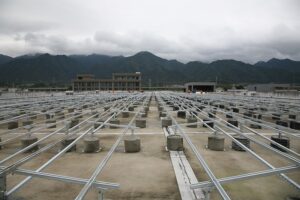
Exploring the Benefits of Clean Energy for Future Generations
As the world grapples with the consequences of climate change and environmental degradation, the transition to clean energy sources is more crucial than ever. This shift is not just a matter of improving our current living conditions; it represents a fundamental change that can impact future generations. Clean energy, derived from renewable resources such as solar, wind, hydroelectric, and geothermal energy, offers a sustainable path forward. This article explores the myriad benefits of clean energy and underscores its importance for the future.
The Environmental Impact
One of the most pressing issues facing our planet today is environmental degradation, primarily driven by fossil fuel consumption. The burning of coal, oil, and natural gas releases greenhouse gases, leading to climate change, air pollution, and water contamination. Shifting to clean energy sources can significantly reduce carbon emissions and other pollutants, resulting in a healthier planet for future generations.
Clean energy helps to combat climate change by reducing our reliance on fossil fuels, which are a significant source of greenhouse gases. Renewable energy sources are inherently sustainable, emitting little to no carbon dioxide during operation. For instance, solar panels convert sunlight directly into electricity without any harmful emissions, and wind turbines harness the power of wind without depleting natural resources or polluting the atmosphere.
Economic Advantages
The clean energy sector is rapidly growing, offering substantial economic benefits. As investment in renewable energy increases, jobs in this field are being created at an unprecedented rate. According to recent reports, employment in renewable energy has outpaced job growth in fossil fuels, offering diverse opportunities in engineering, manufacturing, installation, and maintenance.
Transitioning to clean energy can also lead to lower energy costs over time. Although the initial investment in renewable technologies can be higher than fossil fuel infrastructures, the long-term savings in operational costs, due to the availability of free and abundant energy sources, outweigh these initial expenses. For instance, the sun provides an immense amount of energy daily, and once solar panels are installed, the ongoing costs are minimal.
Energy Independence and Security
Utilizing clean energy can enhance a nation’s energy independence and security. Nations that rely heavily on imported fossil fuels are vulnerable to market fluctuations and geopolitical tensions. By investing in renewable energy infrastructure, countries can harness their local resources and reduce dependency on foreign energy supplies.
Moreover, renewable energy sources are abundant and widely distributed across the globe. Countries rich in sunlight can use solar power, while those with strong winds have the potential to invest in wind energy. This decentralization of energy production can lead to more resilient energy systems that better withstand disruptions, whether from natural disasters or geopolitical events.
Health Benefits
The connection between fossil fuel consumption and public health is a growing concern. The extraction, transportation, and burning of fossil fuels contribute to air and water pollution, which has serious health impacts, including respiratory diseases, cardiovascular issues, and premature deaths. A transition to clean energy can lessen these health risks.
Clean energy technologies produce little to no harmful emissions, leading to improved air quality and a reduction in health-related costs. Studies have shown that investing in renewable energy can prevent tens of thousands of premature deaths annually, offsetting healthcare costs and improving overall public health.
Technological Innovation
The clean energy sector is at the forefront of technological innovation, pushing the boundaries of what is possible. The development of more efficient solar panels, advanced wind turbine designs, and innovative energy storage solutions are just a few examples of how technology is evolving to support a sustainable energy future. These innovations can lead to increased efficiency, reduced costs, and enhanced accessibility of clean energy for all.
Moreover, exploring clean energy can encourage educational institutions and research facilities to focus on innovations in renewable technologies. By training a new generation of scientists, engineers, and policy-makers, we can create a knowledgeable workforce ready to tackle the energy challenges of the future.
Social Equity and Access to Energy
Clean energy has the potential to promote social equity by making energy more accessible to underserved communities. Many areas currently lacking reliable energy source can benefit from renewable technologies that can be deployed on a smaller scale. Solar panels, for instance, can be installed on rooftops in urban neighborhoods, or solar-powered microgrids can be established in rural areas where extending traditional infrastructure is economically unfeasible.
Furthermore, as clean energy technologies become more affordable, they can provide lower income households with the opportunity for energy savings. These communities often bear a disproportionate burden of energy costs, which can lead to energy poverty. By integrating clean energy solutions, these households can reduce their bills and gain access to reliable power, which in turn ensures better quality of life and opportunities for economic advancement.
Educational Opportunities
The growing clean energy sector opens up numerous educational avenues for future generations. With an increasing demand for skilled professionals in renewable energy, educational institutions can develop programs and curricula that prepare students for careers in this dynamic field. Engaging young minds in sustainability concepts encourages critical thinking and problem-solving abilities, essential skills for addressing future challenges.
Moreover, through educational initiatives focused on clean energy, students can gain hands-on experience in the latest technologies, fostering innovation and creativity. This exposure not only equips them for various career paths but also instills a sense of responsibility towards the environment and community.
Global Collaboration and Climate Action
Investing in clean energy fosters global collaboration as nations unite to combat climate change. Renewable energy initiatives promote shared goals and responsibilities, creating partnerships that transcend borders. Collaborative projects encourage knowledge sharing and resource pooling, leading to greater advancements in technology and policy.
Moreover, clean energy plays a crucial role in international climate agreements, such as the Paris Accord, which aims to limit global warming. As countries collectively commit to renewable energy targets, they reinforce the importance of accountability in global efforts to address environmental issues. This kind of cooperation is vital for ensuring a sustainable planet for future generations.
The Path Forward
The benefits of clean energy for future generations are undeniable, spanning environmental, economic, health, and social dimensions. As we stand at a crossroads, transitioning to a clean energy framework is not merely an option but a necessity. The energy choices we make today will shape the world our children inherit.
To harness these benefits, it is imperative that governments, businesses, and individuals alike prioritize investments in renewable energy. By supporting policies that incentivize clean energy adoption, funding research and innovation, and engaging communities in sustainable practices, we can pave the way for a brighter, cleaner future.
In conclusion, embracing clean energy is essential for fostering a sustainable future. The collective actions we take today can create lasting impacts, ensuring that future generations inherit a healthier planet, an equitable society, and a robust economy. It is not just about energy; it is about legacy. The time to act is now.



